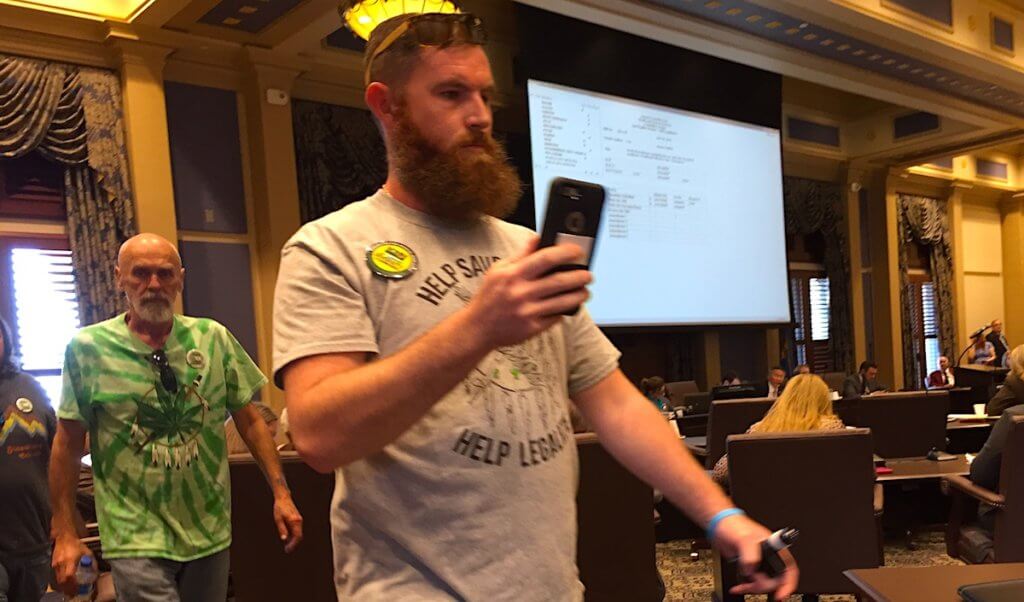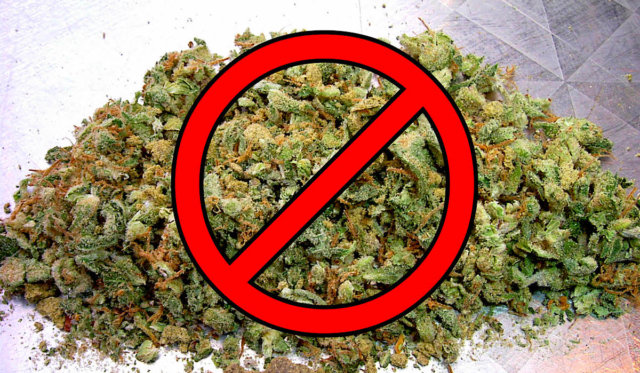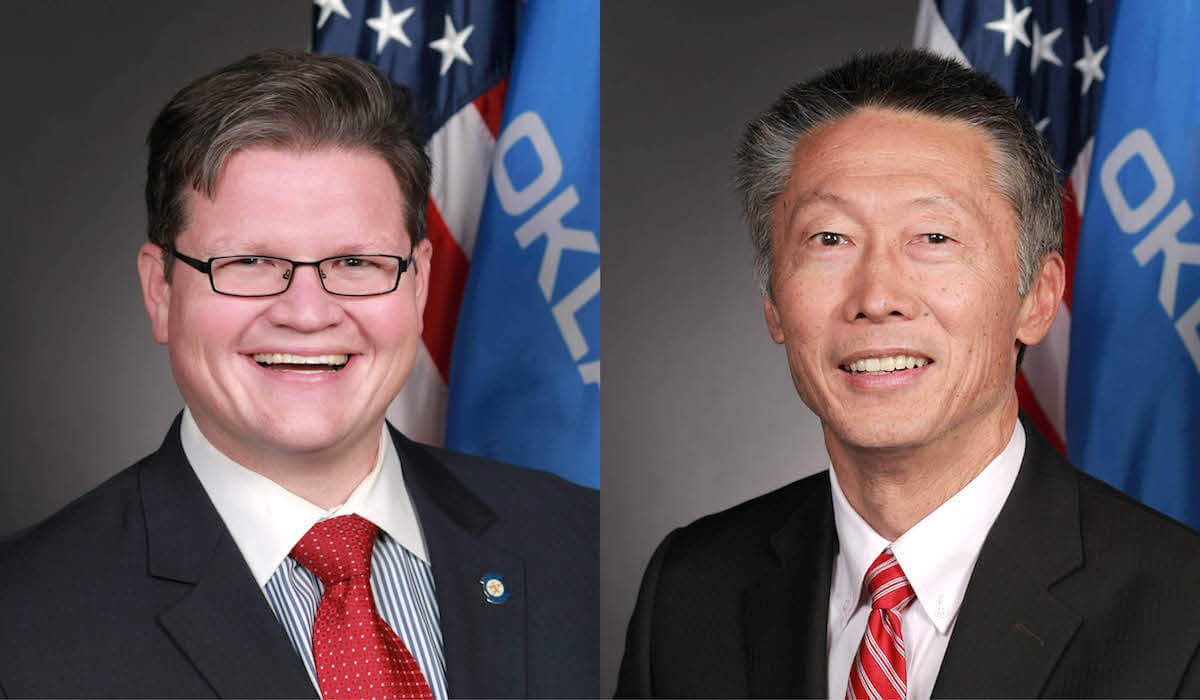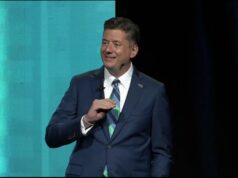A coalition of health care professionals, law enforcement groups, faith leaders and others is forming to oppose State Question 788, which would establish one of the nation’s most progressive medical marijuana statutes in Oklahoma.
“It was packed,” said lobbyist and political consultant Pat Hall of a preliminary meeting at the Oklahoma State Medical Association. “State Question 788, in the opinion of the Oklahoma State Medical Association, is not medical marijuana. It is recreational marijuana.”
Hall represents OSMA and made clear he is not managing the campaign against SQ 788. He and others connected to the group named the Oklahoma Sheriffs Association, the Oklahoma City Chamber of Commerce and the University of Central Oklahoma as among the two dozen groups represented at the preliminary meeting. The Oklahoma Sheriffs Association and the OKC Chamber are both expected to vote on an official position at internal meetings this week.
“The people who were in there are people who we invited,” Hall said. “We’ve since talked to pharmacists who said, ‘Why weren’t we invited?’ We forgot to invite (you). Hospitals have been invited but they weren’t able to attend. The Oklahoma Municipal League is very interested in it.”
Hall said law enforcement entities have concerns as well, demonstrated by the Oklahoma District Attorneys Council having voted to oppose SQ 788 officially.
“We aren’t talking about drunk driving. It’s nowhere in there,” Hall said. “Edibles are nowhere in there.”
Hall noted that, in October, Colorado implemented a ban on certain edible marijuana shapes owing to instances of children mistaking them for candy.
Chamber rep: SQ 788 looks like ‘recreational marijuana disguised by medical marijuana’
Mark VanLandingham, vice president of government relations and policy for the Greater OKC Chamber, said the issue is on his organization’s radar “in a big way.”
“The more we learn about it, the more concerned we get. We haven’t taken an official position on it yet. Our board and executive committee meets Thursday morning,” he said. “We’re looking at joining the group that is going to try to beat it at the ballot. But we’re also looking at whether it could be limited legislatively to not have the full impact as written. There just aren’t very many safeguards or limitations on it.”
VanLandingham agreed with Hall in saying that SQ 788 looks, to him, “a lot like recreational marijuana disguised by medical marijuana.”
He also said language in the ballot measure (embedded below) has given business leaders pause about whether their abilities to guarantee “drug-free workplaces” might be disrupted.
“It looks like it could really impact an employer’s ability to keep their workplace and worksites safe if there aren’t any more restrictions than what is in the state question about who can be prescribed medical marijuana and the amounts they can be prescribed,” VanLandingham said. “From our standpoint, it is a drug-free workplace question, and this looks like it could really get in the way of an employer’s ability to do that in Oklahoma.”
SQ 788 advocates: ‘We’re not changing that’

But advocates for SQ 788 disagree.
“If a company has a drug policy, we’re not changing that in any way,” said Chip Paul, chairman of Oklahomans for Health. “We have anti-discrimination language in the law, but that doesn’t preclude a company like ONEOK or Devon from saying, ‘We are a drug-free workplace.'”
Similarly, Tulsa resident Frank Grove is operating the political action committee Yes on SQ 788, and he says the business groups worried about how the ballot measure will affect workplace rules are mistaken.
“They’re wrong. Plainly, they’re wrong,” Grove said. “I can show them the federal case where DirecTV won against a patient who made that very argument in federal court.”
Grove said SQ 788’s language will not override Oklahoma’s right-to-work status.
“Employers can still hire, fire and test for medical marijuana metabolites,” Grove said. “It explicitly states that medical marijuana cardholders cannot use, possess or be intoxicated while at the workplace.”
Pro SQ 788 advocate: ‘This is like every other drug’
Grove and Paul also disagree with the assessment of Hall and the Oklahoma State Medical Association that SQ 788 is “recreational” marijuana. A message left for Dr. Kevin Taubman, current OSMA president, went unreturned as for this story.
RELATED
SQ 788: Medical marijuana bills address language, scope by Garrett Davis
“That’s a ridiculous claim. In our law, we do something very unique. We do something very different than any other state,” Paul said. “Most states regulate around a medical condition. So it’s not really about physicians, it’s about medical conditions. We regulate around physicians who determine whether you get a medical marijuana card.”
Paul said that means fewer Oklahomans will be getting medical cards than in other states. He said it took him “five minutes” to obtain a California card off the internet while in Oklahoma.
“We don’t want that (abuse) here,” Paul said. “When we say we don’t have medical conditions, that scares people. But we rely on the physician recommendation, which is far more stringent.
“We’re just saying, ‘Hey, this is like every other drug.’ You have to have a prescription to fill it. The only difference is you go to a dispensary to fill it as opposed to a pharmacy.”
Fallin: Legislature should address some of these issues
Among those questioning the wisdom of SQ 788’s language is Gov. Mary Fallin.
“I have concerns about it,” Fallin said of SQ 788. “It’s pretty loose. I hope there will be enough education on what the language does and what it doesn’t do.”
At the State Capitol in late February, she said she has heard concerns about “… the different agencies that may be in charge of regulating the licenses for medical marijuana and also some concerns from employers who are concerned that if they have a workers’ comp claim and someone is high on medical marijuana that it may not be a cause of action for letting someone go on the job if they are high because it would be legal if they had a license for medical marijuana to be on it.”
Fallin said she had not heard of the coalition forming to oppose SQ 788 and instead was looking for legislators to take some sort of action to regulate the issue further. Legislative action would be possible owing to the ballot question being a statutory change as opposed to a constitutional one.
“I think the Legislature should address some of these issues,” she said.
Senate Majority Floor Leader: ‘I really believe it’s recreational’
If the Legislature does, it will likely be through SB 1120 by Sen. Earvin Yen (R-OKC) — which would regulate the drug for only a handful of conditions — and HB 3468 by Rep. John Paul Jordan (R-Yukon). That bill, unveiled last week, would create the Oklahoma Cannabis Commission under the Oklahoma State Department of Health to promulgate further rules about medical marijuana regulation in the state. Both bills have passed committees of origin.
“With the current state of the Department of Health, a lot of that money flows through the Department of Health,” said Senate Majority Floor Leader Greg Treat (R-OKC). “I have some concerns about the implementation, and do people really realize what they’re voting on because it’s being sold as medicinal. I really believe, when I read it, that it’s recreational.”
But Grove hopes the Legislature avoids making major statutory changes to the proposal.
“Here in Oklahoma, I’m tired of the state government wreaking havoc, and other people are, too,” he said. “We need the state government to stay out of the relationships of doctors and patients.”
Pro SQ 788 leader: ‘We are willing to compromise on certain issues’
Grove said he does not believe the people opposing SQ 788 are malicious.
“They’re uneducated about cannabis because there’s been a lot of negative information that’s been pushed over the years,” Grove said. “There’s been a lot of skewed studies. As a result, people have a fear. So they need to do more research.”
To that end, Grove invited any groups or individuals concerned about SQ 788 to contact him.
“We’ve sat down and compromised with everyone so far, and we are willing to sit down and compromise on certain issues,” he said. “Absolutely.”
Grove noted only two areas where he and advocates would not want to compromise:
- He does not want to see a list of qualifying conditions implemented “because of the people it would leave behind.”
- Second, he said Oklahomans should want to avoid “the monopolization of the industry.”
Oklahoma’s financial thresholds for entry into either the cultivation or dispensing business would be comparatively low and progressive compared to other states.
“As far as workplaces, we can make tweaks. As far as any other details, we can make tweaks,” Grove said. “But those are the things people aren’t willing to step aside on.
“State Question 788 is set in stone. What we tell people is that on June 26, we are legalizing medical marijuana. But the details are going to change. They have changed in every other state.”
